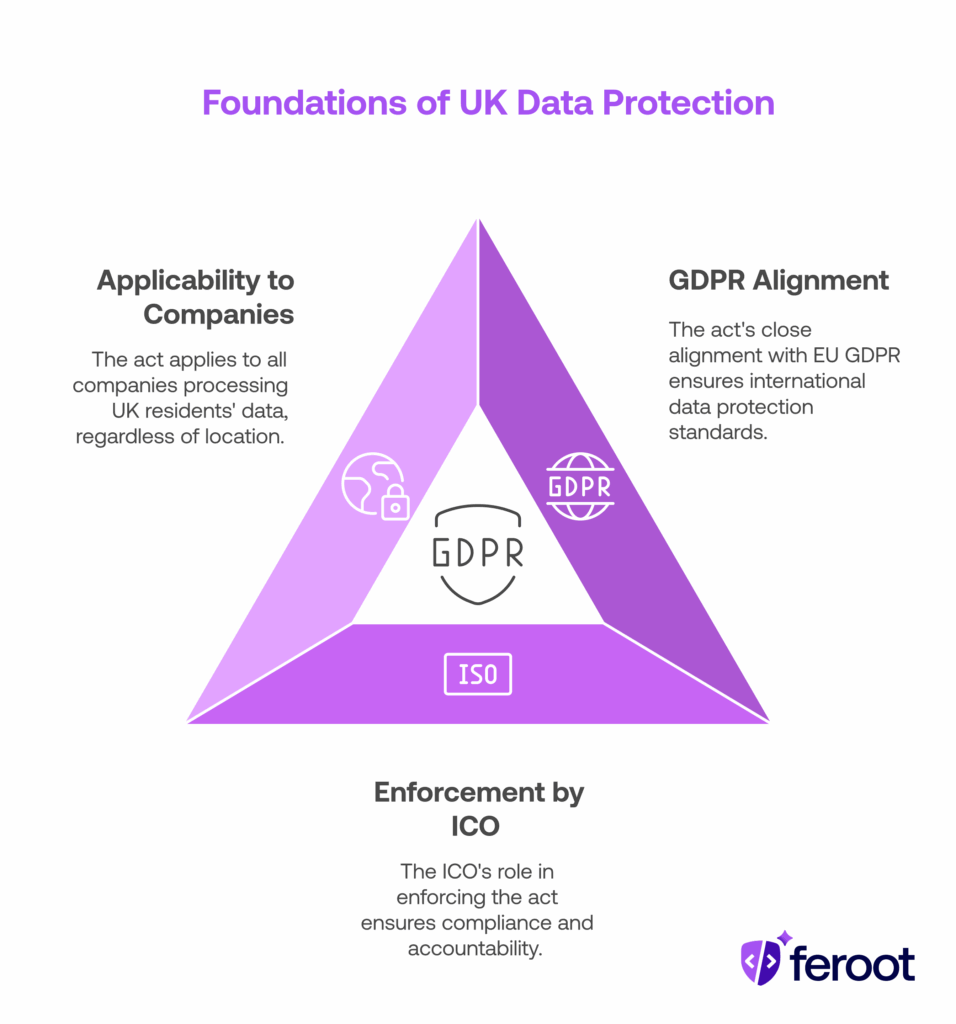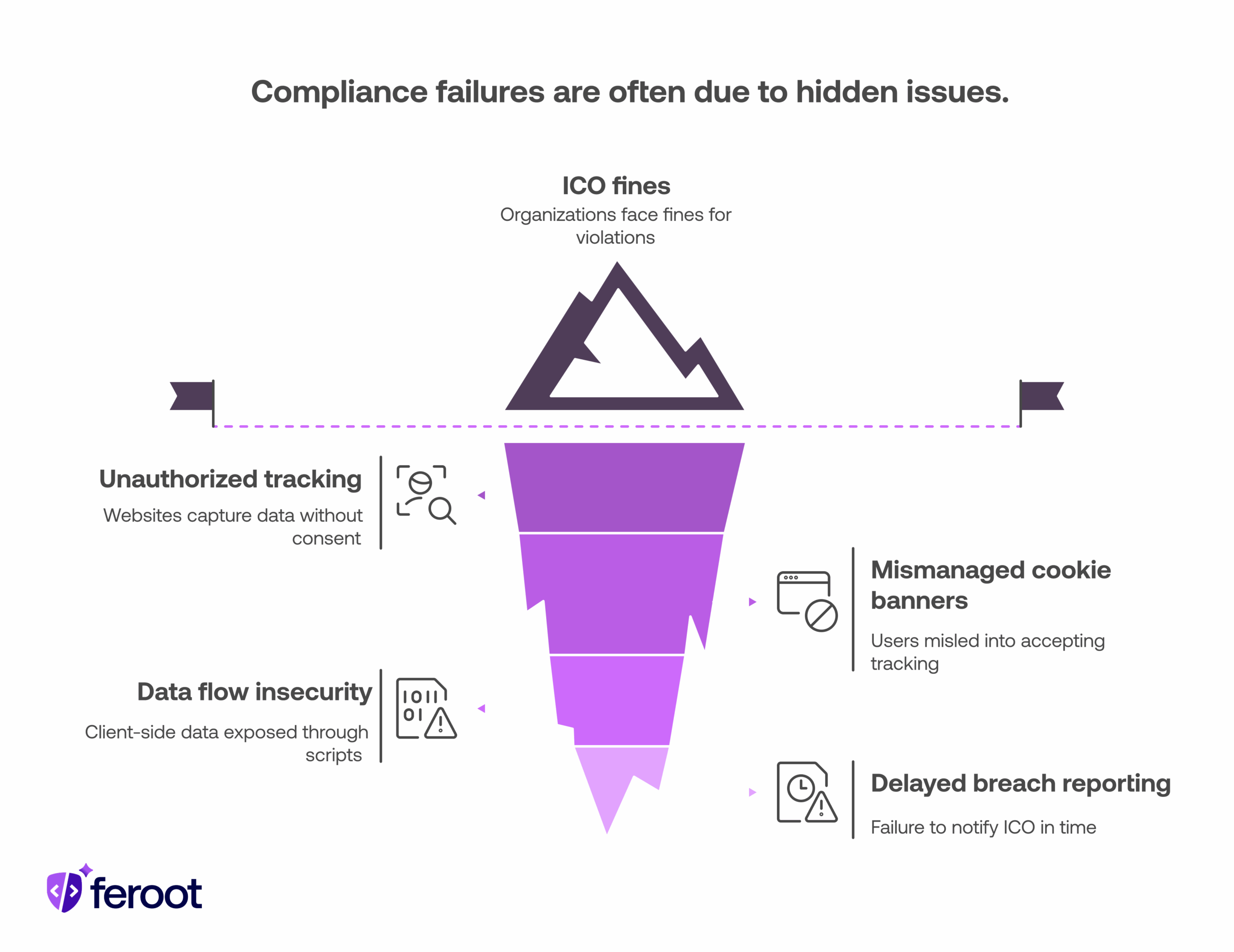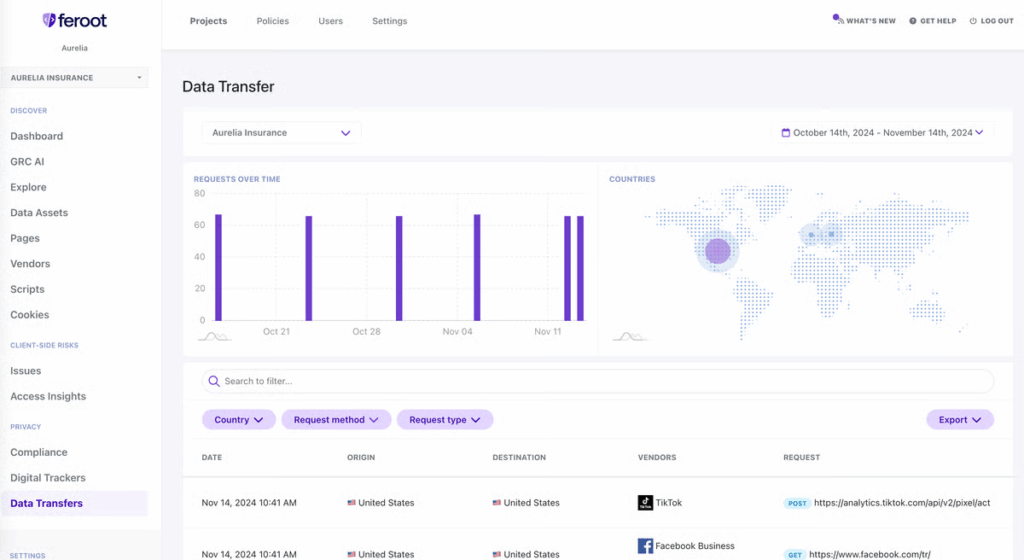TL;DR
- What it is: The United Kingdom Data Protection Act (UK DPA 2018) implements and supplements the EU GDPR for the UK, setting rules for how organizations collect, process, and store personal data.
- Why it matters: Noncompliance can lead to major fines from the UK Information Commissioner’s Office (ICO) and reputational damage.
- Who it applies to: Any organization handling personal data of UK residents, whether or not the company is physically based in the UK.
- Common pitfalls: Weak consent management, uncontrolled third-party trackers, poor client-side visibility, and inadequate breach reporting.
- How Feroot helps: By monitoring, mapping, and securing client-side scripts and third-party data flows, Feroot enables compliance with UK DPA requirements around lawful processing, transparency, accountability, and data security.
Introduction: Does the UK Data Protection Act Apply to My Business?
If your website or app collects personal data from users in the United Kingdom, the UK Data Protection Act (UK DPA 2018) likely applies to you. Many businesses assume that GDPR alone covers their data protection obligations, but since Brexit, the UK operates its own version of GDPR, supplemented and enforced through the DPA.
The complexity is in the details: the UK DPA introduces unique UK-specific provisions, enforcement powers for the ICO, and additional obligations for organizations processing sensitive data. Yet, many businesses fail compliance not because of back-end systems, but due to unmonitored client-side scripts, tracking pixels, and tag managers that leak personal information without authorization.
Feroot Security goes beyond traditional PCI DSS and HIPAA coverage by helping businesses achieve visibility and control over client-side data collection—a critical but overlooked compliance challenge under the UK DPA.
What Is the UK Data Protection Act (UK DPA 2018)?
The UK DPA 2018 is the UK’s primary data protection law, which:
- Aligns closely with the EU GDPR but introduces UK-specific legal frameworks.
- Is enforced by the Information Commissioner’s Office (ICO).
- Applies to all companies—domestic and international—that process the personal data of UK residents.

Covered organizations include:
- E-commerce and retail businesses with UK customers.
- Healthcare providers and insurers handling sensitive patient data.
- Financial institutions and fintech apps with UK account holders.
- SaaS platforms and digital services with UK-based users.
Key Compliance Requirements Under the UK DPA
The UK DPA integrates GDPR principles but includes specific obligations. Businesses must comply with:
- Lawful, fair, and transparent processing (Section 2 & GDPR Art. 5–6).
- Explicit consent for sensitive categories of data (Schedule 1).
- Data subject rights (Sections 45–54): access, rectification, erasure, restriction, portability, and objection.
- Accountability obligations: maintain processing records and security controls (Section 61).
- Security of processing (Section 66 & GDPR Art. 32): ensure confidentiality, integrity, and availability of personal data.
- Restrictions on automated decision-making (Part 2, Chapter 2).
- Breach notification to ICO within 72 hours (Part 6).
Common Compliance Failures
Despite the clear legal framework, many organizations face ICO fines and enforcement actions for:
- Unauthorized third-party tracking: Popular websites unknowingly let adtech scripts or analytics tools capture personal identifiers without proper consent.
- Mismanaged cookie banners: Users are often misled into accepting unnecessary tracking, violating transparency principles.
- Failure to secure client-side data flows: Login credentials, payment details, and health information are sometimes exposed through uncontrolled scripts.
- Delayed breach reporting: Many organizations fail to notify the ICO within the 72-hour window.

High-profile ICO fines—such as those against British Airways and Marriott—demonstrate how overlooked vulnerabilities, especially in front-end systems, can lead to massive regulatory penalties.
How Feroot Helps Organizations Meet UK DPA Compliance
Feroot Security directly addresses the client-side data protection challenges that the UK DPA makes critical. Here’s how Feroot maps to compliance requirements:
1. Monitoring and Enforcement
- Requirement mapped: Security of processing (Section 66).
- Continuously monitors all scripts running in the browser.
- Detects unauthorized modifications, malicious injections, and data exfiltration attempts.
- Provides enforcement policies that block harmful behaviors in real time.
2. Transparency for Data Flows
- Requirement mapped: Transparency and accountability (Section 61).
- Offers a visual map of all first- and third-party scripts on your website.
- Reveals how personal data moves across tag managers, analytics, and adtech tools.
- Demonstrates compliance with data subject rights by showing exactly where data is going.

3. Real-Time Alerts – Rapid Incident Response
- Requirement mapped: Breach notification within 72 hours (Part 6).
- Instantly flags suspicious script behavior, such as unauthorized data collection or injection.
- Equips teams to respond quickly, minimizing risk of ICO fines.
4. Compliance Reporting – Audit-Ready Documentation
- Requirement mapped: Accountability principle and record-keeping obligations.
- Generates audit logs and visual compliance reports.
- Provides proof of monitoring and enforcement that can be shared directly with regulators.
By securing the browser and client-side environment, Feroot gives organizations the visibility and controls they need to avoid the most common DPA failures.
FAQ
What are the penalties for violating the UK DPA?
Organizations can face fines more than approximately £20 million or 4% of global annual turnover, whichever is higher.
Does the UK DPA apply to websites that use third-party trackers?
Yes. If trackers collect personal data from UK residents, you’re responsible for ensuring lawful processing and consent—even if the tracker belongs to a vendor.
Can script monitoring help with UK DPA compliance?
Absolutely. The ICO expects organizations to demonstrate technical and organizational controls. Monitoring client-side scripts prevents hidden data collection that could undermine compliance.
How can I prove to ICO auditors that my site is secure?
Feroot’s reporting tools provide audit-ready logs and visual maps of script behavior, showing active monitoring and proactive data protection.
What tools can detect unauthorized third-party data collection?
Feroot’s is purpose-built to identify and stop unauthorized client-side data flows.
Conclusion
The UK DPA is often overshadowed by the EU GDPR, but it carries serious legal and financial consequences for businesses serving UK residents. The most common compliance failures happen at the client-side level, where scripts and trackers operate outside traditional IT visibility.
Feroot provides the browser-side observability, enforcement, and reporting that organizations need to confidently meet UK DPA obligations while avoiding costly ICO penalties.


